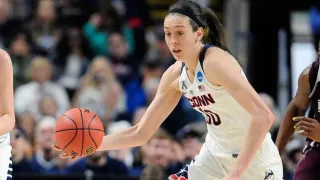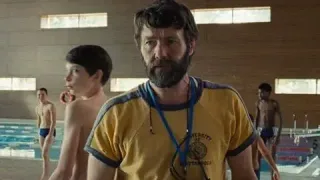October 8, 2021
LGBTQ+ Athletes: Why More Sportspeople Are Coming Out
READ TIME: 4 MIN.
This article is republished from The Conversation.
Jack Hardwicke, University of Northampton; Eric Anderson, University of Winchester; Keith Parry, Bournemouth University, and Rory Magrath, Solent University
Sport, up until very recently, was considered a hostile environment for LGBTQ+ athletes. The treatment of some of sport's first openly LGBTQ+ athletes, such as tennis player Billie Jean King and footballer Justin Fashanu, shows this.
But this year has seen a significant flurry of events that suggest sport is becoming much more inclusive. In June 2021, for example, Carl Nassib came out publicly as the first "out" gay male in the NFL. Then, Clay Davies came out publicly as the first out gay elite male cyclist in Britain. As with other gay male athletes before them in recent years, both have been met with public support.
The recent (delayed) Tokyo 2020 Olympics also had the largest number of out LGBTQ+ athletes ever – with 186 LGBTQ+ athletes competing – while the Paralympics had a record 36. The 2020 Olympics was also a first in that multiple openly transgender or non-binary athletes took part. This is why these games have been dubbed the "Rainbow Olympics" and have been seen as a "turning point for LGBTQ+ athletes".
Support has also been forthcoming from heterosexual allies. In Formula One, Sebastian Vettel joined several drivers in voicing his support for LGBTQ+ rights ahead of the 2021 Hungarian Grand Prix and wore a rainbow "Same Love" T-shirt during the national anthem.
While in the recent men's 2020 European Football Championships, which was also delayed due to COVID, some of the world's best players, such as Harry Kane and Manuel Neuer, wore rainbow-colored captain's armbands in support of LGBT+ communities, all of which helps create space for LGBTQ+ athletes to feel safe enough to come out.
These events are particularly significant as they occur in sports not traditionally associated with LGBTQ+ athletes or inclusion. Formula One and football are hyper-masculine sports, often considered to have macho and homophobic cultures. Indeed, despite equality, diversity and inclusion organizations warning that sport remains a hostile environment for sexual minorities, there is now significant evidence to suggest that this is quickly changing.
Sport's evolution
For some time now, research has shown that a range of sports are becoming far more inclusive and accepting of sexual minority athletes. And this is likely reflecting a wider shift in societal attitudes towards LGBTQ+ people and diversity.
While recent data from the US shows that the acceptance of homosexuality in society often remains divided by country, region and economic development, overall there has been increasing acceptance in most countries.
Research in the UK, for example, consistently shows high levels of acceptance of homosexuality - with only 16% of those surveyed in 2018 believing same-sex relationships were either "always" or "mostly" wrong. While in Japan, the 2020 Olympic host nation, recent polling data found that almost 80% of people 60 and under now support same-sex marriage.
Perhaps the clearest example of changing social and legal rights for sexual minorities is the increasing number of countries legalizing same-sex marriage – albeit not in Japan, despite increasing support for its introduction. Most recently, this includes Switzerland, whose referendum on September 26 showed nearly two-thirds in favor of "Marriage for all".
The politicization of sport
Although it's often argued by right-wing commentators that "politics should stay out of sport", sport is always political – and this is something that seems to be increasing. International sporting events often see nations compete against each other – so politics will always be involved. And it seems unlikely that calls for de-politicizing sport will be met.
A small research study in the US, from 2011, suggests that previously some athletes did not like to engage with activism as it was thought it could "cost the athlete endorsement monies". It has also been argued that athletes have too much to lose by speaking out against social ills. But with the shifting political climate and the increasing politicisation of sport, this seems to be changing – particularly regarding LGBTQ+ issues in sport. There's been a rise, for example, in the number of LGBTQ+ athletes securing endorsements from large corporations.
This shift is important because most sports have a large LGBTQ+ fan base. During the recent Olympic Games, for example, Outsports, a website dedicated to LGBTQ+ involvement in sport, declared that its traffic increased dramatically.
With the continued progress towards a more inclusive society and increasing levels of acceptance of LGBTQ+ athletes, we'll likely see many more sportspeople coming out over the next few years.
And, given the increasingly inclusive society in which elite sport is now played, it may even be that the Paris 2024 Olympics will supersede the "Rainbow Olympics" of Tokyo 2020.![]()
Jack Hardwicke, Lecturer in Health Sociology, University of Northampton; Eric Anderson, Professor of Masculinities, Sexualities and Sport, University of Winchester; Keith Parry, Deputy Head Of Department in Department of Sport & Event Management, Bournemouth University, and Rory Magrath, Course Leader, School of Sport, Health and Social Sciences, Solent University
This article is republished from The Conversation under a Creative Commons license. Read the original article.






